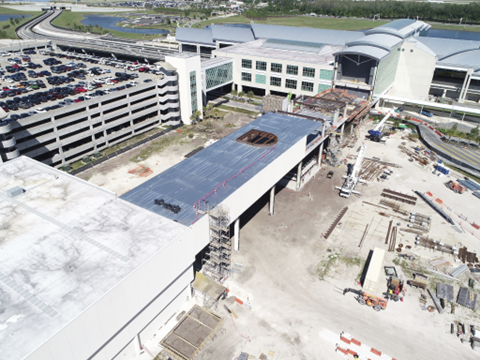Biden-Harris Administration Announces $76 Million in Grants from Bipartisan Infrastructure Law to Modernize Airports, From Runway Improvements to Better Facilities

WASHINGTON – The U.S. Department of Transportation’s Federal Aviation Administration (FAA) is awarding another $76.1 million from the previously allocated $9 billion, for 45 airport-related infrastructure projects in 22 states. The projects are funded under President Biden’s Bipartisan Infrastructure Law Airport Infrastructure Grants (AIG) program, part of the $25 billion total included in the law for airport improvements, including front-of-house projects such as terminal expansions and baggage system upgrades.
“Millions of Americans fly every day, and it’s important that our nation’s airports be equipped to handle such a volume of passengers,” said U.S. Transportation Secretary Pete Buttigieg. “The grants we’re announcing today will make key improvements to ensure passengers move safely and efficiently through our airports—and is another example of the Biden-Harris Administration’s commitment to modernizing our nation’s aviation systems.”
View a data visualization of the airports receiving funding.
“These grants help make key improvements that enhance safety and efficiency at airports of all sizes across the nation.” said FAA Associate Administrator for Airports, Shannetta R. Griffin, P.E.
Airports receiving funding today include:
- $6.4 million to Colorado Springs Airport in Colorado: This project rehabilitates the existing terminal building to accommodate a 14,000 square foot Federal Inspection Service facility to allow passengers to clear customs more efficiently upon arrival. The rehabilitation includes space reconfiguration, meeting current Americans with Disabilities Act (ADA) requirements, and increasing energy efficiency.
- $3 million to Melbourne Orlando International Airport in Florida: This project funds the first phase of the terminal building rehabilitation, which consists of the installation of a new baggage system.
- $1.8 million to South Bend International Airport in Indiana: This project reconstructs 8,500 feet of the existing Taxiway B pavement that has reached the end of its useful life. The project improvements also correct the Taxiway B alignment geometry to meet FAA design standards; enhance the maneuvering of commercial aircraft on the airport terminal apron and improve the overall operational safety of the non-movement area.
- $2.4 million to Easton Airport in Maryland: This project improves the Runway 22 safety area to enhance the safety of operations at the airport. This project includes continued construction site preparation, including drainage.
- $8.3 million to Bangor International in Maine: This project rehabilitates 7,436 feet of Runway 15/33 to maintain the structural integrity of the pavement and to minimize debris. This project includes rehabilitating 2,241 feet of runway pavement.
- $1 million to Dickinson-Theodore Roosevelt Regional Airport in North Dakota: This project funds the design phase which reconstructs the existing 10,200 square foot terminal building to allow for the efficient movement of passengers and baggage.
- $2.9 million to Grand Forks International Airport in North Dakota: This project funds runway reconstruction projects to maintain the structural integrity of the pavement and to minimize debris.
- $27.8 million to Harry Reid International Airport in Las Vegas, Nevada: This project installs runway edge drains to protect the Runway 8R/26L and taxiway pavements from deterioration. This project also reconstructs 104,416 square yards of the existing holding pad apron pavement which will prevent further pavement deterioration and reduce debris, creating a safer aircraft parking area.
- $8.1 million to Joe Foss Field Airport in Sioux Falls, South Dakota: This project funds the design phase to expand the existing terminal building an additional 42,000 square feet to increase the airport's capacity to meet the operational needs of the airport. Additionally, the project rehabilitates 24,600 square feet of the existing terminal building to meet design standards.
- $1 million to Friday Harbor Airport in Washington: This project increases the capacity of the existing airport fuel farm by adding a supplemental tank for Jet A fuel and installing a larger 12,500-gallon aviation gas fuel tank.
A full list of AIG grants being announced is available on the FAA website.
Today’s funding is from the Airport Infrastructure Grant program, one of three aviation programs created by President Biden’s Bipartisan Infrastructure Law. To date, nearly $9 billion of the $15 billion total of AIG funding has been made available to airports across the country. Learn more at faa.gov/bil.
President Biden’s Bipartisan Infrastructure Law makes a historic investment in our nation’s infrastructure and competitiveness by rebuilding America’s roads and bridges, upgrading and expanding public transit and rail, and modernizing the nation’s ports and airports. To date, the Administration has announced over $448 billion in Bipartisan Infrastructure Law funding for over 51,000 infrastructure projects across the nation and has mobilized over $688 billion in private sector manufacturing and clean energy investments in the United States.
